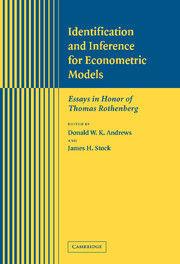Book contents
- Frontmatter
- Contents
- List of Contributors
- Preface
- Part I Identification and Efficient Estimation
- Part II Asymptotic Approximations
- 8 Asymptotic Expansions for Some Semiparametric Program Evaluation Estimators
- 9 Higher-order Improvements of the Parametric Bootstrap for Markov Processes
- 10 The Performance of Empirical Likelihood and Its Generalizations
- 11 Asymptotic Bias for GMM and GEL Estimators with Estimated Nuisance Parameters
- 12 Empirical Evidence Concerning the Finite Sample Performance of EL-type Structural Equation Estimation and Inference Methods
- 13 How Accurate is the Asymptotic Approximation to the Distribution of Realised Variance?
- 14 Testing the Semiparametric Box–Cox Model with the Bootstrap
- Part III Inference Involving Potentially Nonstationary Time Series
- Part IV Nonparametric and Semiparametric Inference
9 - Higher-order Improvements of the Parametric Bootstrap for Markov Processes
Published online by Cambridge University Press: 24 February 2010
- Frontmatter
- Contents
- List of Contributors
- Preface
- Part I Identification and Efficient Estimation
- Part II Asymptotic Approximations
- 8 Asymptotic Expansions for Some Semiparametric Program Evaluation Estimators
- 9 Higher-order Improvements of the Parametric Bootstrap for Markov Processes
- 10 The Performance of Empirical Likelihood and Its Generalizations
- 11 Asymptotic Bias for GMM and GEL Estimators with Estimated Nuisance Parameters
- 12 Empirical Evidence Concerning the Finite Sample Performance of EL-type Structural Equation Estimation and Inference Methods
- 13 How Accurate is the Asymptotic Approximation to the Distribution of Realised Variance?
- 14 Testing the Semiparametric Box–Cox Model with the Bootstrap
- Part III Inference Involving Potentially Nonstationary Time Series
- Part IV Nonparametric and Semiparametric Inference
Summary
ABSTRACT
This paper provides bounds on the errors in coverage probabilities of maximum likelihood-based, percentile-t, parametric bootstrap confidence intervals for Markov time series processes. Analogous results are given for delta method confidence intervals (which are based on first-order asymptotics). The bounds show that the parametric bootstrap for Markov time series provides higher-order improvements over delta method confidence intervals that are comparable to those obtained by the parametric and nonparametric bootstrap for i.i.d. data and are better than those obtained by the block bootstrap for time series. Additional results are given for Wald-based confidence regions.
The paper also shows that k-step parametric bootstrap confidence intervals achieve the same higher-order improvements as the standard parametric bootstrap for Markov processes. The kstep bootstrap confidence intervals are computationally attractive. They circumvent the need to compute a nonlinear optimization for each simulated bootstrap sample. The latter is necessary to implement the standard parametric bootstrap when the maximum likelihood estimator solves a nonlinear optimization problem.
INTRODUCTION
A line of research to which Tom Rothenberg has made significant contributions is that of Edgeworth expansions for parametric models. His Econometrica papers on Edgeworth expansions for estimators and tests statistics in the normal linear model, (Rothenberg 1984a,b) are paradigms of elegance. The current paper is in the same line of research, though it is not so elegant. We develop Edgeworth expansions in parametric time series models and utilize these Edgeworth expansions to explore the properties of the parametric bootstrap.
Specifically, this paper analyzes the higher-order properties of the parametric bootstrap for maximum likelihood (ML)–based confidence intervals (CIs) for kth order Markov processes, possibly with exogenous variables.
- Type
- Chapter
- Information
- Identification and Inference for Econometric ModelsEssays in Honor of Thomas Rothenberg, pp. 171 - 215Publisher: Cambridge University PressPrint publication year: 2005
- 8
- Cited by



